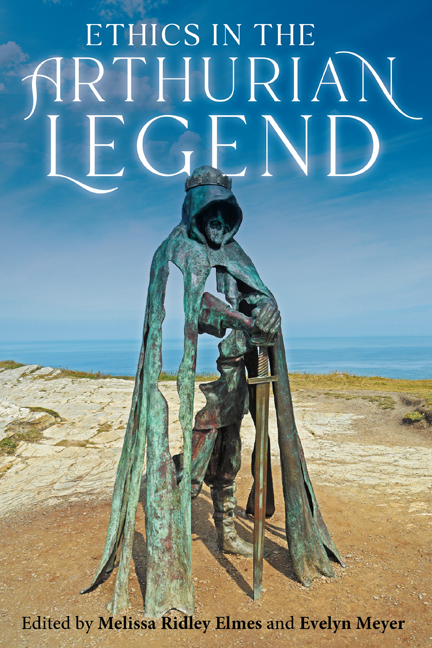Book contents
- Frontmatter
- Contents
- List of Contributors
- Foreword
- Acknowledgments
- Introduction
- 1 Arthurian Ethics before the Pentecostal Oath: In Search of Ethical Origins in Culhwch and Olwen
- 2 Too Quickly or Not Quickly Enough, Too Rash and Too Harshly: The Arthurian Court’s Lack of Ethics in Hartmann von Aue’s Erec and Iwein and Wolfram von Eschenbach’s Parzival
- 3 The Ethics of Arthurian Marriage: Husband vs Wife in Hartmann von Aue’s Iwein
- 4 Arthurian Ethics and Ethical Reading in the Perlesvaus
- 5 Translation Praxis and the Ethical Value of Chivalry in the Caligula Brut
- 6 Imperial Ambitions and the Ethics of Power: Gender, Race, and the Riddarasögur
- 7 Lowland Ethics in the Arthur of the Dutch
- 8 Contesting Royal Power: The Ethics of Good Lordship, Sir Gawain and the Green Knight, and the March of Wales
- 9 “As egir as any lyoun”: The Ethics of Knight-Horse Relationships in Lybeaus Desconus
- 10 Malory’s Ethical Dinadan: Moderate Masculinity in a Crisis of Hypermasculine Chivalry
- 11 Virtus, Vertues, and Gender: Cultivating a Chivalric Habitus in Thomas Malory’s Tale of Sir Gareth
- 12 Kingly Disguise and (Im)Perception in Three Fifteenth- Century English Romances
- 13 “Adventure? What is That?” Arthurian Ethics in/and the Games We Play
- 14 The Ethics of a New Edition of Sir Thomas Malory’s Le Morte Darthur – and More Evidence for the Superiority of the Winchester Manuscript
- 15 The Ethics of Writing Guinevere in Modern Historical Fiction
- Afterword
- Index
15 - The Ethics of Writing Guinevere in Modern Historical Fiction
Published online by Cambridge University Press: 10 January 2024
- Frontmatter
- Contents
- List of Contributors
- Foreword
- Acknowledgments
- Introduction
- 1 Arthurian Ethics before the Pentecostal Oath: In Search of Ethical Origins in Culhwch and Olwen
- 2 Too Quickly or Not Quickly Enough, Too Rash and Too Harshly: The Arthurian Court’s Lack of Ethics in Hartmann von Aue’s Erec and Iwein and Wolfram von Eschenbach’s Parzival
- 3 The Ethics of Arthurian Marriage: Husband vs Wife in Hartmann von Aue’s Iwein
- 4 Arthurian Ethics and Ethical Reading in the Perlesvaus
- 5 Translation Praxis and the Ethical Value of Chivalry in the Caligula Brut
- 6 Imperial Ambitions and the Ethics of Power: Gender, Race, and the Riddarasögur
- 7 Lowland Ethics in the Arthur of the Dutch
- 8 Contesting Royal Power: The Ethics of Good Lordship, Sir Gawain and the Green Knight, and the March of Wales
- 9 “As egir as any lyoun”: The Ethics of Knight-Horse Relationships in Lybeaus Desconus
- 10 Malory’s Ethical Dinadan: Moderate Masculinity in a Crisis of Hypermasculine Chivalry
- 11 Virtus, Vertues, and Gender: Cultivating a Chivalric Habitus in Thomas Malory’s Tale of Sir Gareth
- 12 Kingly Disguise and (Im)Perception in Three Fifteenth- Century English Romances
- 13 “Adventure? What is That?” Arthurian Ethics in/and the Games We Play
- 14 The Ethics of a New Edition of Sir Thomas Malory’s Le Morte Darthur – and More Evidence for the Superiority of the Winchester Manuscript
- 15 The Ethics of Writing Guinevere in Modern Historical Fiction
- Afterword
- Index
Summary
Modern historical fiction and fantasy authors, like myself, who work with the Arthurian legend in the twenty-first century have a different perspective on ethics and the Arthurian tradition than many of the other scholars in this book who approach it from an academic position. While we read and interact with the medieval, romantic, and Victorian works, most of us are not academically trained. Therefore, we come to the Arthurian canon from an outside perspective, relying heavily on the research and interpretation of others who have studied the texts over the centuries to form and frame our fiction. Because of this, we often understand the medieval period and its influences on Arthurian characters very differently and have different goals from historical scholars. While we try to be as true to the time period as possible, our goal is to produce fiction that adds to the tradition for a modern audience as opposed to seeking to understand what has already been written or what really happened in history.
For example, in my Guinevere's Tale Trilogy, I chose to tell the traditional story of King Arthur and Camelot from Guinevere's perspective, giving her a fictional life as a priestess before her marriage to King Arthur and as a warrior defending her ancestral lands after Arthur's death, neither of which are part of the core legend. I also chose to make her a physically, intellectually, and emotionally strong woman unlike many of the stereotypically submissive incarnations of the past. This focus on Guinevere – a character who wasn't as fully explored as King Arthur until around 1980, the beginning of modern Arthurian fiction – and other twists on the key elements of the traditional story are my contributions to the ongoing evolution of the legend. As this article will show, the aim of most modern Arthurian historical fiction and fantasy authors is to contribute to the legend in ways that speak to readers and issues of our own time, while remaining true to the original legend within the confines of the subgenre in which we write. At the same time, other authors, in creating modern “sequels” to the original legend, employ creative license that takes them farther from the historical path to allow for parody, supernatural, or other re-interpretations of the existing story in order to make specific points about modern life.
- Type
- Chapter
- Information
- Ethics in the Arthurian Legend , pp. 357 - 386Publisher: Boydell & BrewerPrint publication year: 2023



